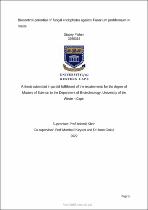Biocontrol potential of fungal endophytes against Fusarium proliferatum in maize
Abstract
Fusarium proliferatum is a fungal pathogen that is the cause of numerous diseases in various
crops of fruit and vegetables. About 25% of the maize crops harvested annually are affected by
mycotoxins produced by F. proliferatum which causes huge economic fatalities to the
agricultural and industrial services. Fungal endophytes are naturally occurring and ever-present
in various host plants. Fungal endophytes exist symbiotically with host plants; thus, they gain
nutrients whilst providing benefits to the host plant. Due to the harmful effects of fungicides,
an alternative eco-friendly method is required to protect crops from pathogenic fungi such as
F. proliferatum, this includes the use of fungal endophytes, however, its effects have not been
elucidated in literature.

